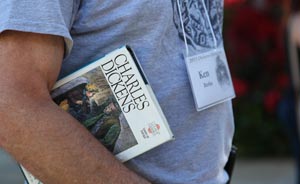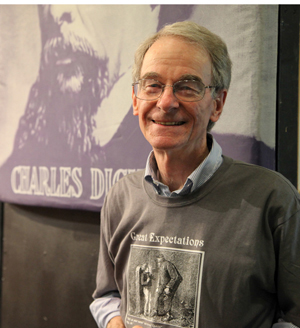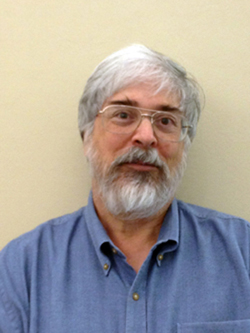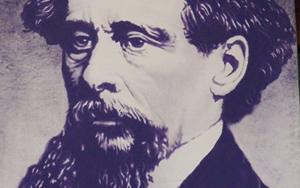Campus News
New Presidential Chair to support Dickens Project and Literature Studies at UC Santa Cruz
UC Santa Cruz has received a $500,000 gift, plus matching funds from the UC Regents, to establish a $1 million Jordan-Stern Presidential Chair for Dickens and Nineteenth-Century Studies.




UC Santa Cruz has received a $500,000 gift from John Jordan and Michael Stern, plus matching funds from the UC Regents, to establish a $1 million Jordan-Stern Presidential Chair for Dickens and Nineteenth-Century Studies.
The gift will provide support for research and teaching of nineteenth-century literature, and the development and implementation of programs for the Dickens Project in the Humanities Division.
A scholarly consortium headquartered at UC Santa Cruz, The Dickens Project consists of members from more than 40 universities across the United States and around the globe. It is internationally recognized as the premier center for Dickens studies in the world and is one of the leading sites for research on 19th-century British culture.
Increasing support for the Humanities Division and endowed chairs are goals of the Campaign for UC Santa Cruz, which to date has raised more than $210 million in resources for the campus.
John Jordan is an emeritus faculty member of the Literature Department. During his past four decades at UC Santa Cruz, he was a founding faculty member of Merrill College and one of the original founders of the Dickens Project.
Although he is now retired from his faculty position, Jordan will continue on as director of the Dickens Project until 2019, a position he has held for the past 30 years.
Michael Stern is senior counsel at Cooley LLP in Palo Alto. He received a J.D. from the University of California, Berkeley, Boalt Hall School of Law; a Ph.D. in English from Yale University; an M.A. in English from the University of Cambridge, where he was a Kellett fellow at Clare College; and a B.A. in English (magna cum laude, Phi Beta Kappa) from Columbia University.
Jordan noted that Stern discovered the Dickens Project four years ago after reading a feature story about it in the New Yorker magazine. “He was pleased and surprised to learn we existed and are so close to where he is in Palo Alto,” said Jordan.
“Reading Dickens was a formative experience for me,” said Stern. “His inimitable energy, artistry and critical vision made the prospect of doing English utterly compelling.”
“In his own time, Dickens bridged many gulfs–between social classes, between literary and popular culture, and between different media and modes of performance,” he added. “In our time, he continues to do so. The Dickens Project is a unique venue enabling that.”
“There’s no other place where great scholars and ordinary fans and lay readers like me can have a powerful collective experience interpreting and enjoying a great writer like Dickens, who continues to speak to us across two centuries. I’m honored to have the opportunity to join John in helping make sure that continues,” Stern noted.
Jordan pointed out that the new Presidential Chair does not replace the current Dickens $1 million endowment drive launched last year at the annual Dickens Universe gathering at UC Santa Cruz.
“The $1 million endowment drive that I launched last summer is for the Friends of the Dickens Project and goes to support the outreach part of the Project–specifically the Dickens Universe,” said Jordan.
“The new Presidential chair is for scholarly and academic support.” The two are complementary. That’s the dual mission of the Dickens Project: public outreach in humanites, and research and teaching.
Jordan noted that The Friends endowment now has raised $200,000 to date, with a number of additional pledges expected over the next several years.
“The combination of the Presidential chair and the Friends endowment will go a long way in ensuring the Dickens Project remains financially sustainable and stays headquartered at UC Santa Cruz,” said Jordan.
The Campaign for UC Santa Cruz supports excellence across the university through increased private investment in the people and ideas shaping the future. It is bringing critical new resources to each academic division, and to signature initiatives in the student experience, genomics, coastal sustainability, data science, and the intersection of the arts and sciences.